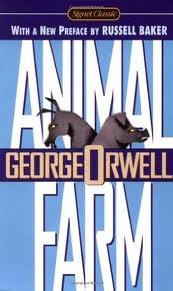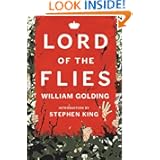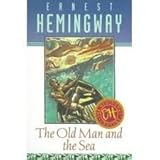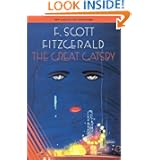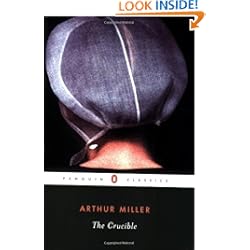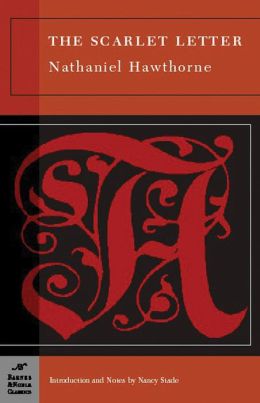"Now, comrades, what is the nature of this life of ours? Let us face it: our lives are miserable, laborious, and short. We are born, we are given just so much food as will keep the breath in our bodies, and those of us who are capable of it are forced to work to the last atom of our strength; and the very instant that our usefulness has come to an end we are slaughtered with hideous cruelty. No animal in England knows the meaning of happiness or leisure after he is a year old. No animal in England is free. The life of an animal is misery and slavery: that is the plain truth."
"ALL ANIMALS ARE EQUAL BUT SOME ANIMALS ARE MORE EQUAL THAN OTHERS"
I am a little burned out on the Classic Books Every High Schooler Should Read, as I am reading two years worth of a high school curriculum in one summer. Animal Farm is the other summer reading book selection for my future honors freshman, coupled with Lord of the Flies. I remember reading AF in 7th grade reading and really NOT getting it at all, and in retrospect I think it was an inappropriate choice for my teacher to have made. Reading it as an adult, I still felt like I didn't have enough of a solid background to 'get it' and have been brushing up on related wikis of the Russian Revolution, Stalin, Lenin, Trotsky, as well as the North Korean Famine, Chinese Re-education Farms, and the Rwandan Genocide. With all that said, I feel like it's a pretty hefty novel to give students who have just finished up 8th grade to read on their own over the summer.
As an adult who has now lived through a handful of governments toppling under people's desire for revolution, I have a much greater appreciation for the novel. It was powerful, moving, angering, and ridiculous. Napoleon's coming to power under a revolution and then turning the farm into a police state was scary (particularly after watching the Ai Weiwei documentary two nights ago). Squealer's propaganda machine was so eye-rollingly bad but I have no doubt to its effectivenss. The animals' acceptance of information and philosophy was maddening, but I've also listened to a high school senior give a very serious presentation about the Illuminati (in case you're wondering, they control everything from Presidential elections to Superbowl winners) and then seen an entire class of seniors regard that student as the upmost expert on the field of Illuminati conspiracies and BELIEVE HIM. I also know a college educated person who works in the math field post on Facebook links to articles that show that global warming is just liberal propaganda, so....yup. Squealer, eye-rollingly bad, yet effective. The way history is re-written is evident in the way that North Korea exists in the world. My only critique is that GO gets a little NH and at the end is like, "HEY DID YOU GET MY ALLEGORY? DID YOU GET IT? IF YOU DIDN"T GET IT I AM GOING TO EXPLAIN IT TO YOU! DO YOU GET IT NOW? YEAH YOU DO BECAUSE I TOLD YOU." That part I could have lived without, but what do I know? I am not an author and have no alternative ending suggestions for GO.
So, actually, as an adult who has now lived through a bunch of experiences, I have a much greater appreciation for the novel. I am very interested to see what my students reactions are to it, but I wish I could guide them through it because I feel like it's the perfect text to explore what function you think a government should have in society. Also, the kindergarten teacher in me totally wants to have my students make a flag for our country and our school, and the government teacher in me totally wants to have my students make their X# COMMANDMENTS, and the soft science teacher in me totally wants to have my students look into social science experiments on how advertising works, and the English teacher in me wants to bring it all together brilliantly. Especially when paired with Lord of the Flies! My previous school required social contracts, which I was a fan of; I am thinking of bringing the practice over to my new school, so my freshman will have at least one opportunity to create a democratic contract among themselves as to how they want the society of my classroom to function - if nothing else it could be a great starting point for our discussions of summer reading.
"ALL ANIMALS ARE EQUAL BUT SOME ANIMALS ARE MORE EQUAL THAN OTHERS"
I am a little burned out on the Classic Books Every High Schooler Should Read, as I am reading two years worth of a high school curriculum in one summer. Animal Farm is the other summer reading book selection for my future honors freshman, coupled with Lord of the Flies. I remember reading AF in 7th grade reading and really NOT getting it at all, and in retrospect I think it was an inappropriate choice for my teacher to have made. Reading it as an adult, I still felt like I didn't have enough of a solid background to 'get it' and have been brushing up on related wikis of the Russian Revolution, Stalin, Lenin, Trotsky, as well as the North Korean Famine, Chinese Re-education Farms, and the Rwandan Genocide. With all that said, I feel like it's a pretty hefty novel to give students who have just finished up 8th grade to read on their own over the summer.
As an adult who has now lived through a handful of governments toppling under people's desire for revolution, I have a much greater appreciation for the novel. It was powerful, moving, angering, and ridiculous. Napoleon's coming to power under a revolution and then turning the farm into a police state was scary (particularly after watching the Ai Weiwei documentary two nights ago). Squealer's propaganda machine was so eye-rollingly bad but I have no doubt to its effectivenss. The animals' acceptance of information and philosophy was maddening, but I've also listened to a high school senior give a very serious presentation about the Illuminati (in case you're wondering, they control everything from Presidential elections to Superbowl winners) and then seen an entire class of seniors regard that student as the upmost expert on the field of Illuminati conspiracies and BELIEVE HIM. I also know a college educated person who works in the math field post on Facebook links to articles that show that global warming is just liberal propaganda, so....yup. Squealer, eye-rollingly bad, yet effective. The way history is re-written is evident in the way that North Korea exists in the world. My only critique is that GO gets a little NH and at the end is like, "HEY DID YOU GET MY ALLEGORY? DID YOU GET IT? IF YOU DIDN"T GET IT I AM GOING TO EXPLAIN IT TO YOU! DO YOU GET IT NOW? YEAH YOU DO BECAUSE I TOLD YOU." That part I could have lived without, but what do I know? I am not an author and have no alternative ending suggestions for GO.
So, actually, as an adult who has now lived through a bunch of experiences, I have a much greater appreciation for the novel. I am very interested to see what my students reactions are to it, but I wish I could guide them through it because I feel like it's the perfect text to explore what function you think a government should have in society. Also, the kindergarten teacher in me totally wants to have my students make a flag for our country and our school, and the government teacher in me totally wants to have my students make their X# COMMANDMENTS, and the soft science teacher in me totally wants to have my students look into social science experiments on how advertising works, and the English teacher in me wants to bring it all together brilliantly. Especially when paired with Lord of the Flies! My previous school required social contracts, which I was a fan of; I am thinking of bringing the practice over to my new school, so my freshman will have at least one opportunity to create a democratic contract among themselves as to how they want the society of my classroom to function - if nothing else it could be a great starting point for our discussions of summer reading.
